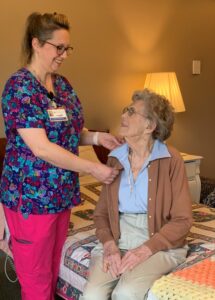Recognizing Professional Caregivers: the Backbone of Aging Services
Home » Recognizing Professional Caregivers: the Backbone of Aging Services
Home » Recognizing Professional Caregivers: the Backbone of Aging Services

At LeadingAge, we acknowledge the dedicated professionals who provide care and support to older adults every day. National Caregivers Day (February 17, 2023) is a special opportunity to recognize these invaluable professionals, as well as the millions of family caregivers. If you are a LeadingAge member, we prepared resources for you.
Just how important are these individuals to older adults and families? Professional caregivers provide support to 20 million older adults who require assistance completing self-care and other daily tasks due to physical, cognitive, developmental, and/or behavioral conditions. It takes millions of skilled, devoted professionals to accomplish this. The caregiving workforce consists of (according to PHI):
- 2.6 million home care workers
- 647,500 aides working in residential care homes
- 471,000 nursing assistants working in nursing homes
Many of the caregivers feel called to this work because it provides a sense of meaning and purpose. They form deep bonds with their clients and residents, who are sometimes described as family.
Meet some of the caregiving experts at LeadingAge member organizations!
- Justina Kosseh, CNA at Isabella Center for Rehabilitation and Nursing Care in New York City, said about her career: “I care about people so much, especially older ones. When I first came to the United States from West Africa, I knew immediately what I wanted to do and that was to care for the older adult population with empathy, compassion, dignity and respect.”
- Hazel Snead, RN at Circle Center Adult Day Services, Richmond, VA, reflects on making the change from pediatrics. “Working with older adults has opened my eyes. Nursing is very rewarding, but I hope my work with older adults specifically will inspire others to get into this field. It takes people who want to care for others like their own family.”
- Hazel supports Eileen Vassar, whose son John has this to say: “Mom is often a little ‘adrift’ as we drive to the Center, but she lights up at the sight of Hazel who greets her with such warmth. Hazel shows my mom compassion even on mom’s toughest days.”
“Front-line caregiving professionals are the backbone of aging services,” said Katie Smith Sloan, LeadingAge president and CEO. “These invaluable caregivers deliver the quality care and extra help that allows millions of older adults to live life to their fullest. Without them, there is no care.
“National Caregivers Day is an opportunity to recognize caregivers. It is a time to redouble our efforts to demand greater support for the millions of professionals who serve older adults. Changing demographics that drive increasing demand for care, a national workforce shortage, inflation and the global pandemic combine to create a crisis for families and push aging services providers to the edge of survival,” Sloan concluded.
Policy Changes Urgently Needed
That’s why LeadingAge is advancing an all-of-government approach, which includes policy changes and additional funding to build and support training and recruitment programs that will help to build the long-term care workforce.
LeadingAge urges Americans to contact their elected officials to urge passage of the Better Care Better Jobs Act, which would make critically needed long-term investments in Medicaid-funded home and community-based services. To send a message to federal lawmakers, advocates can visit the LeadingAge Advocacy Center.
Congressional action should be a no-brainer for lawmakers: the vast majority of U.S. adults support government investment in aging services. The support is overwhelming and bipartisan. Eighty-six percent of U.S. adults say the government must make a bigger investment in services and care for seniors. This includes 92% of Democrats, 80% of Republicans, and 84% of Independents. When has any issue united Americans so strongly?
Direct care providers are critically important to our nation’s health and economy, but most professional caregivers are not sufficiently compensated, primarily due to inadequate reimbursement to provider organizations from Medicare and Medicaid. The median annual earnings for direct care employees are about $21,000, according to PHI. Low pay contributes to the caregiver workforce shortage in aging services, which is at crisis levels.
National Caregivers Day is the perfect time to stand up for the compassionate and dedicated professionals who daily give their all for older adults.